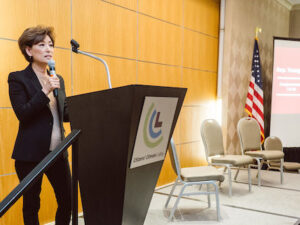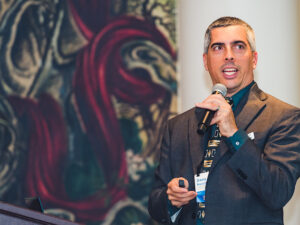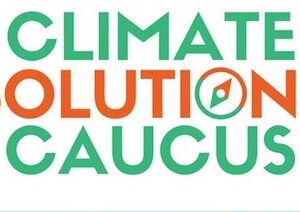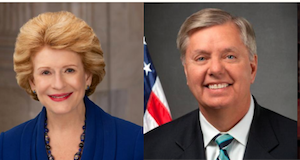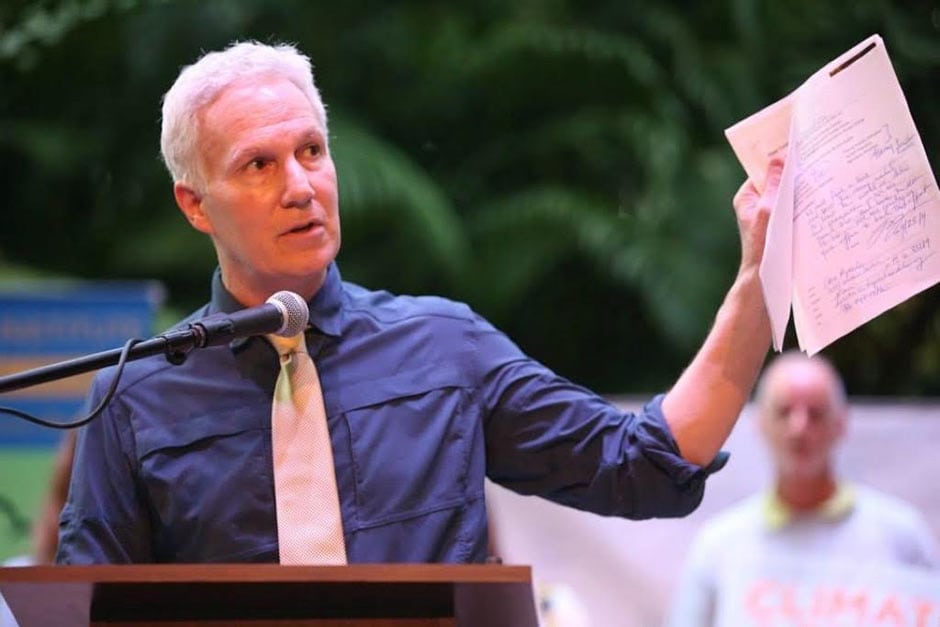
At an Earth Day rally in Miami in 2014, Jay Butera holds a constituent comment form, one of the ways he acquired names and contact information for people who would eventually form the Miami CCL chapter.
By Steve Valk
On a sweltering June day in 2013, a soft-spoken man from Pennsylvania entered the Rayburn cafeteria on Capitol Hill looking for a quick bite. The sushi line appeared to be the shortest. He stepped up to the counter and asked the chef, “What’s good?”
“Avocado Maki,” came the reply.
A tall man approached with the same question and got the same reply. As the two waited for their orders, the Pennsylvanian turned to him, smiled and asked, “How’s your day going?”
“Going pretty well,” he replied.
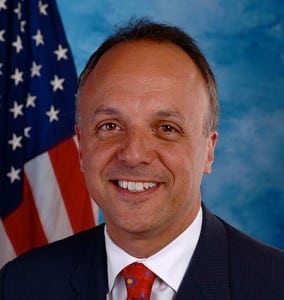
Congressman Ted Deutch (D-FL)
The tall man turned out to be Ted Deutch, a Democrat who represents the 21st District in Florida. The two struck up a conversation about global warming and the impact it was having in Deutch’s district. The congressman extended an invitation to continue talking in his office some time.
Thus began CCL volunteer Jay Butera’s two-and-a-half-year quest to bring Republicans and Democrats together to start talking about what had become the most toxic issue in Washington – climate change.
On Feb. 1 of this year, Deutch joined with Florida Republican Congressman Carlos Curbelo to form the first bipartisan Climate Solutions Caucus in the House. The New York Times called it “a promising step toward sanity… one of the first efforts to break the partisan impasse…”
But the path to last week’s bipartisan breakthrough was no straight line. Butera’s quixotic odyssey took numerous twists and turns, hitting peaks, valleys and roadblocks. Along the way, he learned that “yes” actually means “maybe,” and that “maybe” sometimes means “probably not.” He acquired the patience of Job, the persistence of an Olympic champion, and a SkyMiles accumulation that could rival John Kerry’s.
Initially, Butera thought the most fertile ground for bipartisan talks would be the Florida congressional delegation. With billions of dollars worth of property threatened by rising seas and worsening storms, it seemed that members of Congress representing districts in the Sunshine State would be highly motivated to appear proactive on the climate issue, regardless of their party affiliation.
“When you actually see salt water flooding the streets of Miami, something changes in you. Suddenly climate change gets very real. I began saying to myself, ‘Salt water in the streets will trump party politics.’ That became sort of a mantra I used to stay focused and motivated.
Butera made a list of Democratic and Republican House members from Florida and started talking to their offices about forming a Florida climate caucus. This was two years ago, and at the time, climate change was so toxic the word “climate” couldn’t be used in suggested names for the caucus.
“When I started taking this around, even the Democrats said we’d have a hard time if the “C” word was in the title. We floated names like Coastal Resilience Caucus and Florida Resiliency Caucus. Among the Republicans, many said they were interested, but only if someone else joined first. It was the classic chicken-or-egg impasse.”
Butera started brainstorming with CCL staffer Joe Robertson and Alex Bozmoski from RepublicEn, a think tank dedicated to building support among conservatives for market-based climate solutions. They came up with the idea of organizing a South Florida roundtable to bring local leaders together with Republican members of Congress in hopes that such an event would move the representatives toward joining a bipartisan caucus.
“So now I was going to Capitol Hill with a different ask for the Republican members: ‘Will you come to this roundtable and hear what local leaders have to say?’ And I asked them, ‘Who would you like to see at that table?’ ” Butera said.
Again, he got a lot of “We’d be interested,” but no firm commitments to attend the roundtable. This went on for six months. Ultimately, the project had too many moving parts to be workable. Just the logistics of trying to get multiple members of Congress together in Miami while simultaneously assembling a panel of busy local leaders proved daunting.
The Gibson resolution
Late in 2014, however, a different, more promising, strategy emerged.
Jose’ Aguto from the Friends Committee on National Legislation called CCL Legislative Director Danny Richter and said he was working on a climate change resolution to be introduced by Republicans. The idea was that the resolution would be a first step in getting the GOP engaged on the issue by simply agreeing that climate change is a problem needing to be addressed. Aguto said they wanted Chris Gibson from New York to be the lead sponsor and asked Richter if CCL had any constituents in his district.
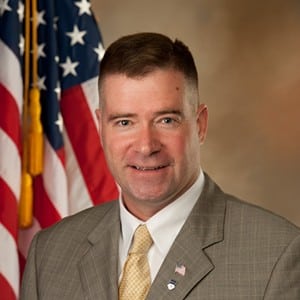
Congressman Chris Gibson (R-NY)
CCL didn’t just have a constituent in Gibson’s district. They had an energized and active chapter, led by Iona Lutey, that had already met several times with Gibson in person, nurturing a relationship of mutual respect, appreciation and trust. That relationship made it easy for Gibson to say “yes.”
That was in September of 2014. Gibson was ready to introduce the resolution early in the next Congress, but the coalition of groups supporting the resolution convinced his staff to wait until a sufficient number of Republicans had signed on as co-sponsors. The magic number they agreed to was 10.
Aware of Butera’s lobbying efforts with the Florida delegation, Richter called Butera and got a short list of Republicans he’d been working with who might sign on to the resolution: Ileana Ros-Lehtinen, Mario Diaz-Balart, and a young, newly-elected second-generation Cuban-American named Carlos Curbelo, who was waiting to be sworn in for his first term in Congress. The list would later expand to include Florida Republican David Jolly.
Butera started to imagine a new path to passage for climate change legislation. Instead of swinging for the fences with a comprehensive bill, a more incremental strategy began to emerge. Get to first base with the Gibson resolution, enticing Republicans to engage on the issue by acknowledging there was a problem that needed handling. Get to second base with the bipartisan climate caucus, where Democrats and Republicans could start talking about solutions. Third base would be introduction of a bipartisan bill, and then bring it home with passage.
“In my mind, it felt like some of the fog was lifting and I could start to see ways these pieces could fit together,” Butera said.
Earlier in 2014, when Butera was trying to organize a congressional Florida climate caucus and the local roundtables on climate change, he noticed he lacked a critical asset for generating the political will to make things happen: An active CCL chapter in Miami.
“I started to realize that if Republicans were willing to cross the aisle on climate change, it would probably be in South Florida districts. But I looked at the CCL chapter map and saw we had nothing south of Tampa.”
Armed with only his personal determination to get a CCL chapter started in Miami, Butera flew south. His game plan: Spend 10 days in Miami looking for people interested in forming a CCL group.
His stay in late April coincided with Earth Day, giving him the opportunity to attend events where he could connect with people concerned about the environment. He developed constituent comment forms where he promised people he would hand deliver their climate message to Capitol Hill in exchange for their contact information.
“This form was a game-changer for me. It got good prospects for CCL, because citizens who want to send a climate message to Congress are probably interested in what we do,” Butera said.
While he was there, as luck would have it, Sen. Bill Nelson (D-FL) held a rare Senate field hearing on sea level rise with testimony from a NASA scientist, the mayor of Miami Beach, and a Broward County commissioner. Butera worked the room, accumulating more names and contact information and inviting people to attend a CCL introductory meeting a few days later at a local café.
“I came back with 70 names of people who were interested and started working the list.”
In December of 2014, Butera and Abhaya Theile, leader of CCL’s group in Gainesville, Florida, led a three-hour workshop to train and orient the newly-minted Miami chapter. Zaurie Zimmerman from CCL’s Boston chapter helped Butera run and organize subsequent meetings as local leaders emerged.
“I came to realize that it takes a village to start a CCL chapter,” Butera said.
It wasn’t long before the new Miami group was pressed into action.
The endorsers project
With a brand new CCL chapter suddenly tasked with delivering three Republican cosponsors for what could be a game-changing climate resolution, the big question became how to get the fledgling group going from zero to sixty in just a matter of weeks?
Butera came up with a plan he hoped would instantly vault the chapter’s impact and magnify its voice.
Even in Washington, all politics is local, and Butera decided the endorsements of local leaders in the districts — mayors, commissioners and business leaders — could provide the persuasive juice to bring skittish representatives on board.
He drafted a sign-on letter for South Florida leaders, which opened with this:
We believe it is time for Congress to acknowledge what we in South Florida already know: that the escalating costs of sea level rise and other climate impacts now pose a serious threat to the economic stability and future habitability of South Florida.
We write to urge you to represent our interests and concerns in this matter. Specifically, we request that you co-sponsor and support an emerging Resolution which seeks to acknowledge that sea level is rising, the climate is changing, the risks are substantial, and that Congress should consider potential responses.
The letter went on to list 10 points of concern about climate change and its impact in South Florida communities, ending with an appeal to co-sponsor the resolution. Butera and the Miami team — including new members Greg Hamra and John Van Leer and CCL veteran Abhaya Thiele — went to work getting signatories. In the end, they amassed endorsements from 55 mayors, commissioners, chamber of commerce leaders, scientists, state representatives and university presidents.
Curbelo emerges as a climate leader
It didn’t take all 55 signatures from the local leaders to convince Congressman Curbelo.
“We had about 20 signatures when I first showed the letter to Mr. Curbelo. When we got to 35 signatures, one of the county commissioners in his district met with the congressman to formally present the letter,” Butera said.
Then, in March of 2015, Curbelo agreed to be the first cosponsor on the Gibson resolution. The commitment came in a meeting between Butera and Curbelo.
“Mr. Curbelo agreed to do what no other Republican had been willing to dare try. He agreed to be the first cosponsor. We shook hands on it. I will never forget that moment. It felt like a turning point. After that meeting, I walked outside and called Danny Richter to give him the news. I was standing there looking up at that beautiful Capitol dome thinking, ‘Wow, this really is democracy!”
But Curbelo was just getting started.
A month later, much to the chagrin of GOP leaders in Congress, he hitched a ride on Air Force One and flew down to Miami on Earth Day to tour the Everglades with President Obama and call attention to climate change. In a press release, he said:
“I share the President’s concerns about sea-level rise, and its effects on our drinking supplies, our economy, and our way of life. I am committed to finding common ground to mitigate the effects of climate change.”
In its coverage of the Everglades tour, the Miami Herald barely mentioned Curbelo, noting his presence at the end of a lengthy story. His effort, however, did not escape the attention of the growing CCL chapter and another nascent group just due west in Naples. The groups flooded their papers with letters to the editor, and Miami CCL volunteer Denise Mendoza came up with another idea: She organized 5th graders at the school where she teaches to write thank you letters to the congressman.
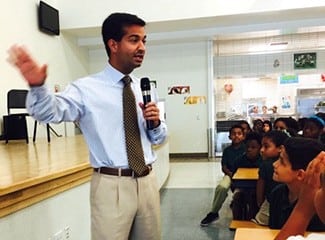
Rep. Carlos Curbelo speaks to fifth graders in his district who wrote him thank-letters for speaking up on climate change.
“I was on Capitol Hill when I got a call from Denise,” Butera said. “She told me she had 50 thank you letters from her students. Said she’d have 200 by Friday.”
He told her to send the letters to him so he could hand-deliver them to Curbelo. Then he got better idea.
“Let’s see if we can get the congressman to visit your school.”
Curbelo came.
“Every one of those 5th graders gave him a hand-written letter thanking him for being a climate hero. Many read their letters aloud to him. It was quite a moment,” Butera said. “And guess what? The Congressman wrote them back!”
A week later a box arrived at the school containing two hundred personal response letters the Congressman had written to every one of those. Butera said interactions like that help strengthen a representative’s resolve to do what needs to be done.
“It’s a process to move them on the ladder of engagement, help them feel the support from their constituents. I think that’s what building political will looks like.”
Ros-Lehtinen comes on board
Getting Ileana Ros-Lehtinen to join as a cosponsor of the Gibson resolution proved more of a challenge. Now into her 14th term in the House, the congresswoman is much in demand, both in Washington and back in her district, making it hard to get an audience.
After amassing the 55 signatures from community leaders, Butera tried to schedule a meeting between Ros-Lehtinen and a group of a dozen mayors, commissioners and chamber of commerce leaders in her Miami district. Each time there was a recess, however, he was told that the congresswoman’s schedule was booked solid.
As CCL’s June conference in Washington approached, Butera got commitments from 10 of the Miami volunteers to come to DC, and Ros-Lehtinen’s scheduler set up a face-to-face meeting.
The meeting with the CCL constituents was postponed for three hours by a thunderstorm that delayed Ros-Lehtinen’s flight from landing in Washington. When she arrived, she had to go straight to the Capitol building, and the Miami group was ushered over to meet with her in a room outside the House chamber.
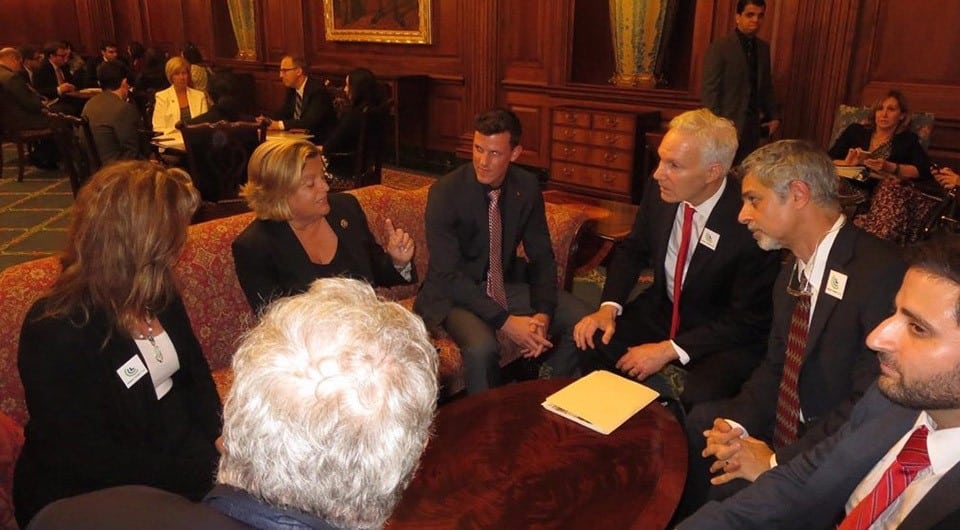
Rep. Ileana Ros-Lehtinen (second from left) meets with Miami CCL volunteers and Jay Butera just outside the House chamber in the Capitol.
They had two requests: Cosponsor the Gibson resolution and meet with the mayors in South Florida. She said “yes” to meeting with the mayors and “maybe” to cosponsoring the resolution.
About a week later, the appointment for the meeting with the Miami leaders came through. There was just one problem:
“We only had three days notice. Three days to schedule 14 of the busiest people in Miami for a make-or-break meeting with the congresswoman. I spent a lot of time on the phone that week.”
But they pulled it together. Even with only three days notice, 14 leaders joined Butera for the meeting, including seven mayors, five chamber of commerce presidents and chairmen, and two county leaders.
Ros-Lehtinen listened to what they had to say and later agreed to cosponsor the climate resolution.
Butera was in Philadelphia when he heard the news. But he wanted to quickly express gratitude for the congresswoman’s decision and jumped on the next train to Washington.
“While I was on the train, I contacted the mayors and chamber leaders and our CCL constituents and asked them to write thank you letters and email me scans. Within hours I was in her office with a stack of printed thank you letters from her district leaders and constituents.”
Meanwhile, other CCL chapters around the country were lobbying their House members along with a coalition of groups that included FCNL, Conservatives for Responsible Stewarship and the Environmental Defense Fund. They eventually brought the remaining eight cosponsors on board. Gibson introduced the resolution on Sept. 17. Since then, two more Republicans – Tom Reed (NY 23) and David Jolly (FL 13) – have cosponsored.
Getting to second base
With 13 Republicans supporting a resolution calling on the House to start working on climate solutions, formation of the Climate Solutions Caucus was the logical next step.
“It became clear to me that the Climate Solutions Caucus we were trying to form was exactly what we needed to fulfill the promise of the Gibson resolution,” Butera said.
While he had lobbied for the Gibson resolution, Butera was sowing the seeds for the caucus by making it his secondary ask.
The very name of the caucus is a testament to how much the conversation has shifted in Washington on climate change, thanks in no small part to the persistent and effective lobbying of CCL volunteers around the country.
“We could never have used that name even a year ago,” Butera said. “The fact that we can be right up front indicates how much progress we’ve made in moving this issue forward.”
After making the rounds in the offices of Gibson resolution cosponsors, Butera came to Curbelo with the names of three Republicans who said they’d join the caucus. He’d also stayed in touch with Ted Deutch, the South Florida Democrat who’d waited patiently in the wings for two years while Butera gathered Republican support. With Deutch aboard as co-chair and a commitment from other Republicans to join the caucus, Curbelo stepped up and the two of them filed the paperwork.
In the weeks to come, Deutch and Curbelo will get their bearings and establish procedures for the caucus. When they’re ready, more House members will be invited to join, coming on Noah’s Ark style – two by two, a Republican for every Democrat, so that the caucus remains balanced and truly bipartisan.
Oh… In case you’re wondering how Butera got involved with CCL, here’s the story:
For a number of years, he had been roaming the marble-floored halls of Congress as a one-man climate lobby.
“It came to a point where I had been working alone and I needed to increase my effectiveness. I decided to call James Hansen and ask what I should do. In looking up his phone number, I found this quote about CCL:”
“Most impressive is the work of Citizens’ Climate Lobby…If you want to join the fight to save the planet, to save creation for your grandchildren, there is no more effective step you could take than becoming an active member of this group.”

